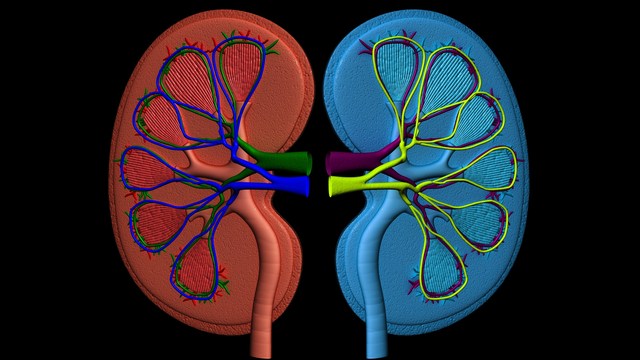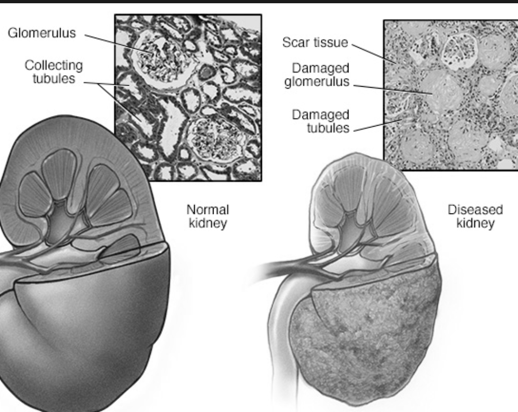 Divakaran Dileep/Photospin
Divakaran Dileep/Photospin
A common gene found in organisms as diverse as worms to humans is offering valuable clues to the origins of kidney development. It could have implications for children with kidney cancer and kidney regeneration in adults, a new study found.
The research team, led by George Q. Daley, MD, PhD, of Boston Children's Hospital analyzed a gene called Lin28, which they say is linked to nearly one-third of cases of Wilms tumor, a pediatric kidney cancer.
Lin28 is closely tied to organ and tissue development and is active in the kidneys during early development.
To see if Lin28 might be a factor in Wilms tumor development, Daley and an international team of collaborators measured the gene's expression in tumor samples from 105 Wilms patients.
Nearly one-third of the tumors examined in the study exhibited high levels of Lin28 activity, according to the study.
Each year an estimated 500 children in the United States are diagnosed with Wilms tumor, also known as nephroblastoma.
Wilms tumors tend to occur in young children, with average diagnosis at 3-4 years of age. It becomes less common as children grow older and is uncommon after age 6. Nephroblastoma is very rare in adults, although cases have been reported.
When doctors examined the tumors under a microscope, they resemble immature (embryonic) kidneys, leading them to conclude Wilms tumors form during fetal development then persist into childhood.
By the time the tumors are detected in children, they are often quite large, weighing one pound on average.
Daley and colleagues engineered mice to express Lin28 in their kidneys. They eventually developed Wilms tumor. But when Lin28 was withdrawn, the tumor decreased in size and severity, indicating that blocking or deactivating the gene holds therapeutic promise for children with Wilms.
"Our data suggest that when Lin28 is active for too long, it keeps the kidneys from completing their developmental program, which would explain Wilms tumors' resemblance to embryonic kidney tissues" said Achia Urbach, PhD, lead author on the study and former Boston Children’s researcher.
Urbach, who engineered a strain of mice to express a Lin28 transgene in the kidneys, is now on the faculty of Bar-Ilan University in Israel.
Researchers also concluded from the mouse model that tightly controlled growth of Lin28 can promote kidney development and may hold clues to one day regenerating damaged kidneys in adults.
The functional part of the kidney, called the nephron, forms exclusively during fetal development and if damaged by kidney disease, cannot regenerate in the adult.
Kidney failure (acute renal failure) leading to the need for dialysis or kidney transplantation, affects 1 in 10 U.S. adults — over 20 million men and women — and is a major burden to the national health care system.
In 2009, federally funded care for patients with kidney failure cost the United States nearly $42 billion, according to the U.S. Renal Data System’s 2010 and 2011 Annual Data Report.
Daley's team showed that a brief controlled pulse of Lin28 expression in their mouse model increased the numbers of nephrons in newborn mice.
The researchers believe further experimental manipulations of Lin28 gene could potentially enable the restoration of normal numbers of nephrons or their regeneration in damaged adult kidneys.
“Damage to adult kidneys can result in scarring rather than healing, which, if extensive, can lead to kidney failure,” Daley said in a press statement. “Further studies of Lin28 will teach us important lessons about kidney development and point to potential new interventions for kidney disease.”
The team reported their findings online April 14, 2014 in the journal Genes & Development.
Lynette Summerill is an award-winning writer and watersports junkie who lives in San Diego with her husband and two beach loving dogs. In addition to writing about cancer-related issues for EmpowHER, her work has been seen in publications internationally.
Sources:
U.S. Centers for Disease Control and Prevention. Kidney Disease, Summary Health Statistics for U.S. Adults: National Health Interview Survey, 2012, tables 7, 8
http://www.cdc.gov/nchs/fastats/kidbladd.htm
National Kidney and Urologic Diseases Information Clearinghouse (NIH). Kidney Disease Statistics for the United States.
http://kidney.niddk.nih.gov/kudiseases/pubs/kustats/#18
Boston Childrens Hospital. Gene linked to pediatric kidney cancer suggest new strategies for kidney regeneration. Irene Sege, 13 April 2014.
http://www.eurekalert.org/pub_releases/2014-04/bch-glt041014.php
Lin28 sustains early renal progenitors and induces Wilms tumor. G.Q. Daley et al. Published in Advance April 14, 2014, doi: 10.1101/gad.237149.113 Genes & Dev. 2014. Abstract at
http://genesdev.cshlp.org/content/early/2014/04/10/gad.237149.113
Reviewed April 22, 2014
by Michele Blacksberg RN
Edited by Jody Smith





Add a CommentComments
There are no comments yet. Be the first one and get the conversation started!